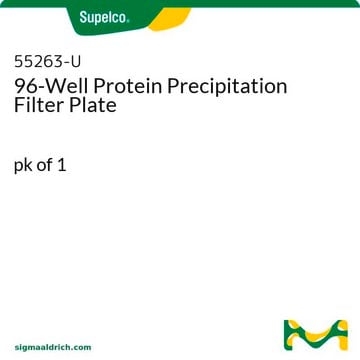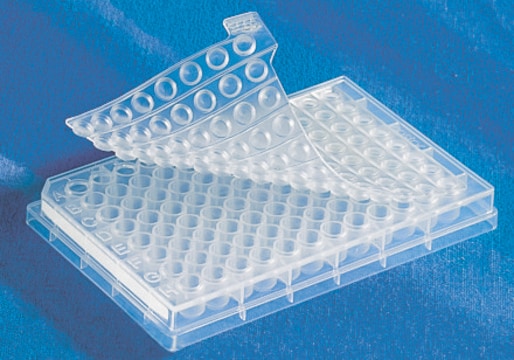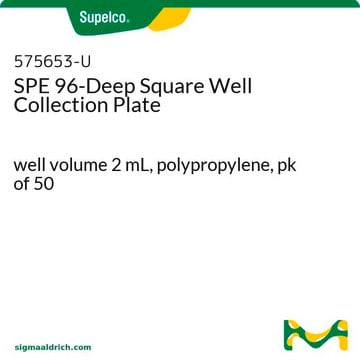575673-U
HybridSPE®-PLus 96-Well solid phase extraction (SPE) Plate
Volume 2 mL, bed wt., 50 mg, pk of 20 ea
Synonyme(s) :
HybridSPE®-PLus
About This Item
Produits recommandés
product name
HybridSPE®-PLus 96-Well Plate, volume 2 mL, pk of 20 ea
Description
96-well Plate
Niveau de qualité
Gamme de produits
HybridSPE®
Composition
bed wt., 50 mg
Conditionnement
pk of 20 ea
Technique(s)
solid phase extraction (SPE): suitable
Volume
2 mL
Groupe de la matrice active
zirconia-based phase
Vous recherchez des produits similaires ? Visite Guide de comparaison des produits
Description générale
Our HybridSPE-PLus products offer the same time-proven chemistry of our traditional HybridSPE-Phospholipid products coupled with manufacturing enhancements that stem from years of production experience. These manufacturing enhancements have allowed us to increase flow consistency and reduce sample hold up volumes, further improving analyte recoveries and assay reproducibility. We invite customers to take advantage of the newest technology; HybridSPE-PLus.
Application
- Development of a High-Throughput Analytical Method for Antimicrobials in Wastewater Using an Automated Pipetting and Solid-Phase Extraction System: This study highlights the utilization of HybridSPE®-PLus 96-Well Plates for environmental analyte testing in wastewater. The method incorporates high-throughput sample preparation and solid phase extraction to efficiently process large sample volumes, proving essential for monitoring pharmaceutical pollutants and ensuring environmental safety (Azuma et al., 2024).
- High-throughput DNA extraction and cost-effective miniaturized metagenome and amplicon library preparation of soil samples for DNA sequencing: This research utilizes HybridSPE®-PLus 96-Well Plates to streamline the preparation of soil sample libraries for high-throughput sequencing. The method emphasizes cost-efficiency and rapid processing, suitable for extensive environmental and biological studies, reflecting the plate′s versatility in sample preparation (Jensen et al., 2024).
- Solvent-free parallel artificial liquid membrane extraction for drugs of abuse in plasma samples using LC-MS/MS: The HybridSPE®-PLus 96-Well Plate is employed for innovative LC-MS/MS sample cleanup in the detection of drugs in plasma. This application underscores the plate′s capacity for enhancing analytical performance in forensic and clinical toxicology by providing a robust, reproducible method for drug testing (Fabris et al., 2024).
- High-throughput sequencing of insect specimens with sub-optimal DNA preservation using a practical, plate-based Illumina-compatible Tn5 transposase library preparation method: In this study, HybridSPE®-PLus 96-Well Plates facilitate high-throughput DNA extraction and sequencing of insect specimens. This highlights the plate′s crucial role in genomic research, particularly in the study of biodiversity and conservation biology, where rapid and efficient DNA analysis is required (Cobb et al., 2024).
- Simultaneous determination of twelve neonicotinoids and six metabolites in human urine with isotope-dilution UPLC-Q-Orbitrap HRMS: This publication details the use of HybridSPE®-PLus 96-Well Plates in a sophisticated chromatographic setup for the quantitative analysis of pesticides in biological samples. The method demonstrates the plates′ effectiveness in environmental and health-related studies, ensuring precise measurement and monitoring of hazardous substances (Zhang et al., 2024).
Caractéristiques et avantages
- Simple 2-3 step standard methodology analogous to traditional protein precipitation provides simultaneous removal of both proteins and phospholipids
- Unique Lewis acid/base retention mechanism effectively removes phospholipids from both hydrophilic and hydrophobic analytes of interest (unlike competitive chemistries) eliminating phospholipid-induced ion suppression
- Highly reproducible, consistent product performance
- Provides cleaner samples for longer column life and less instrument downtime
- Available in 96-well and 1 mL cartridge dimensions
Informations légales
Code de la classe de stockage
11 - Combustible Solids
Classe de danger pour l'eau (WGK)
WGK 3
Point d'éclair (°F)
Not applicable
Point d'éclair (°C)
Not applicable
Faites votre choix parmi les versions les plus récentes :
Déjà en possession de ce produit ?
Retrouvez la documentation relative aux produits que vous avez récemment achetés dans la Bibliothèque de documents.
Les clients ont également consulté
Articles
This article highlights the impact that sample matrix effects can have on LC/MS response and discusses two novel approaches to reduce it.
Protocoles
Immunoassay-based methods for digitoxin or digoxin exist, but are time consuming, labor intensive, and not selective due to similarities in their chemical structures.
Immunoassay-based methods for digitoxin or digoxin exist, but are time consuming, labor intensive, and not selective due to similarities in their chemical structures.
Immunoassay-based methods for digitoxin or digoxin exist, but are time consuming, labor intensive, and not selective due to similarities in their chemical structures.
Immunoassay-based methods for digitoxin or digoxin exist, but are time consuming, labor intensive, and not selective due to similarities in their chemical structures.
Notre équipe de scientifiques dispose d'une expérience dans tous les secteurs de la recherche, notamment en sciences de la vie, science des matériaux, synthèse chimique, chromatographie, analyse et dans de nombreux autres domaines..
Contacter notre Service technique







